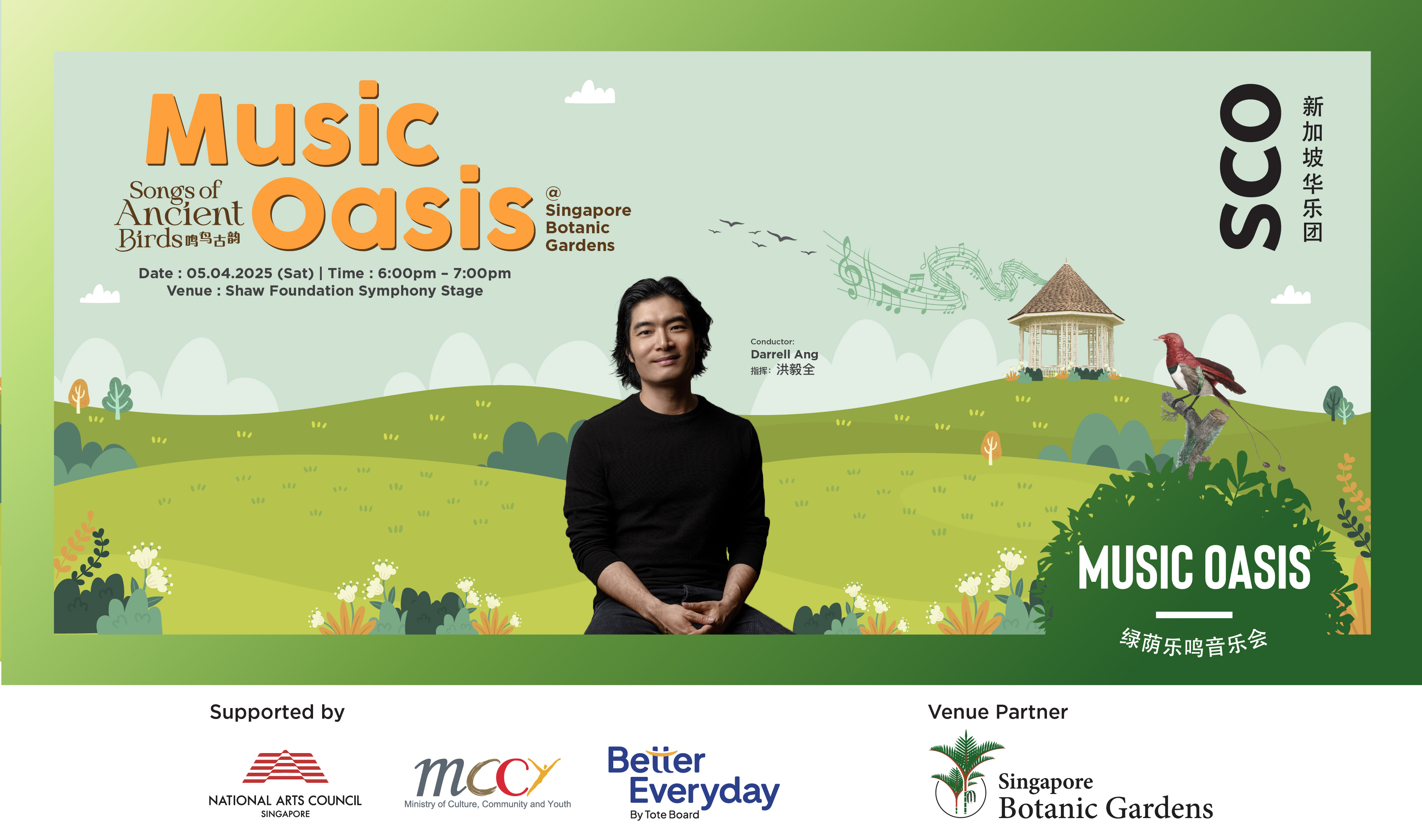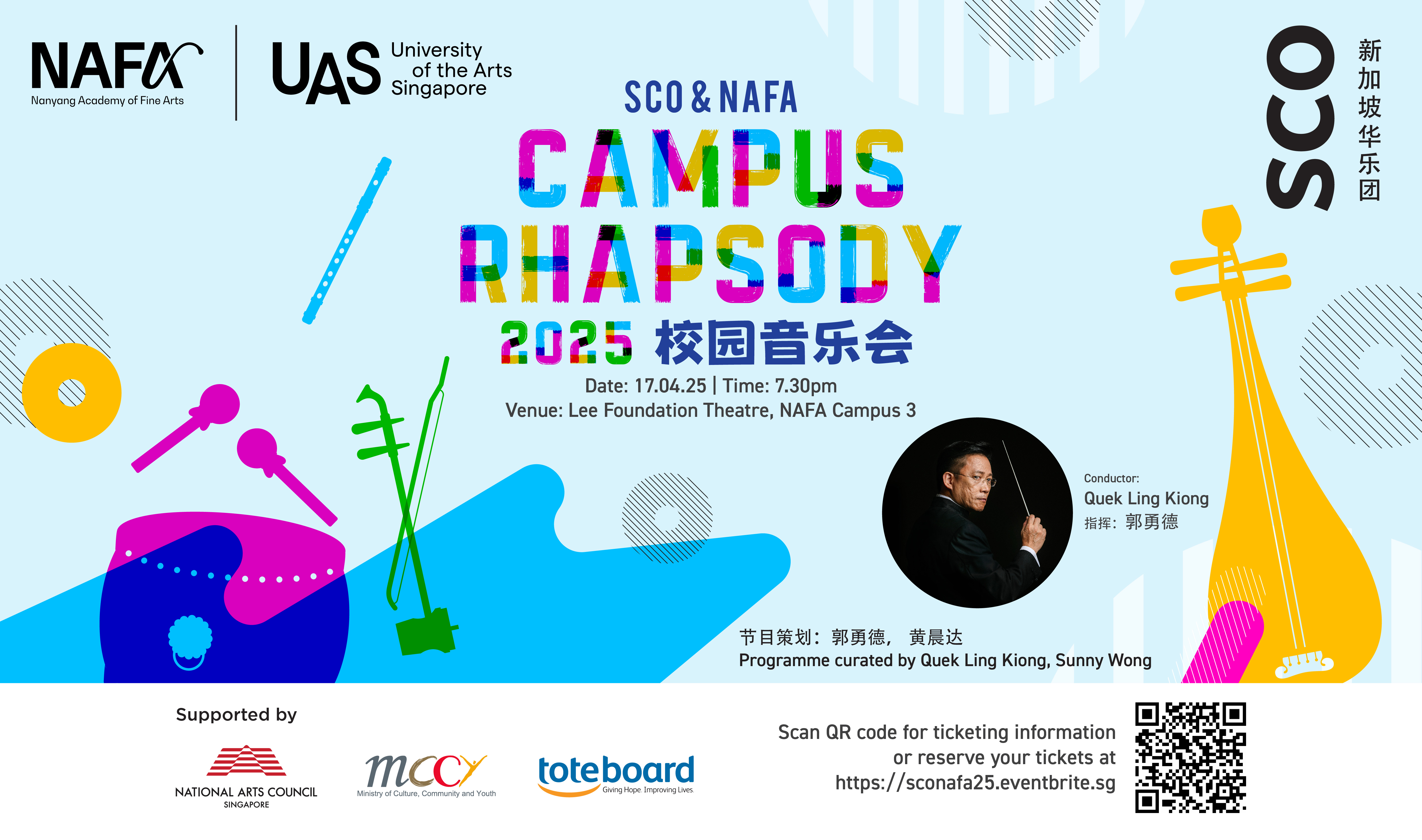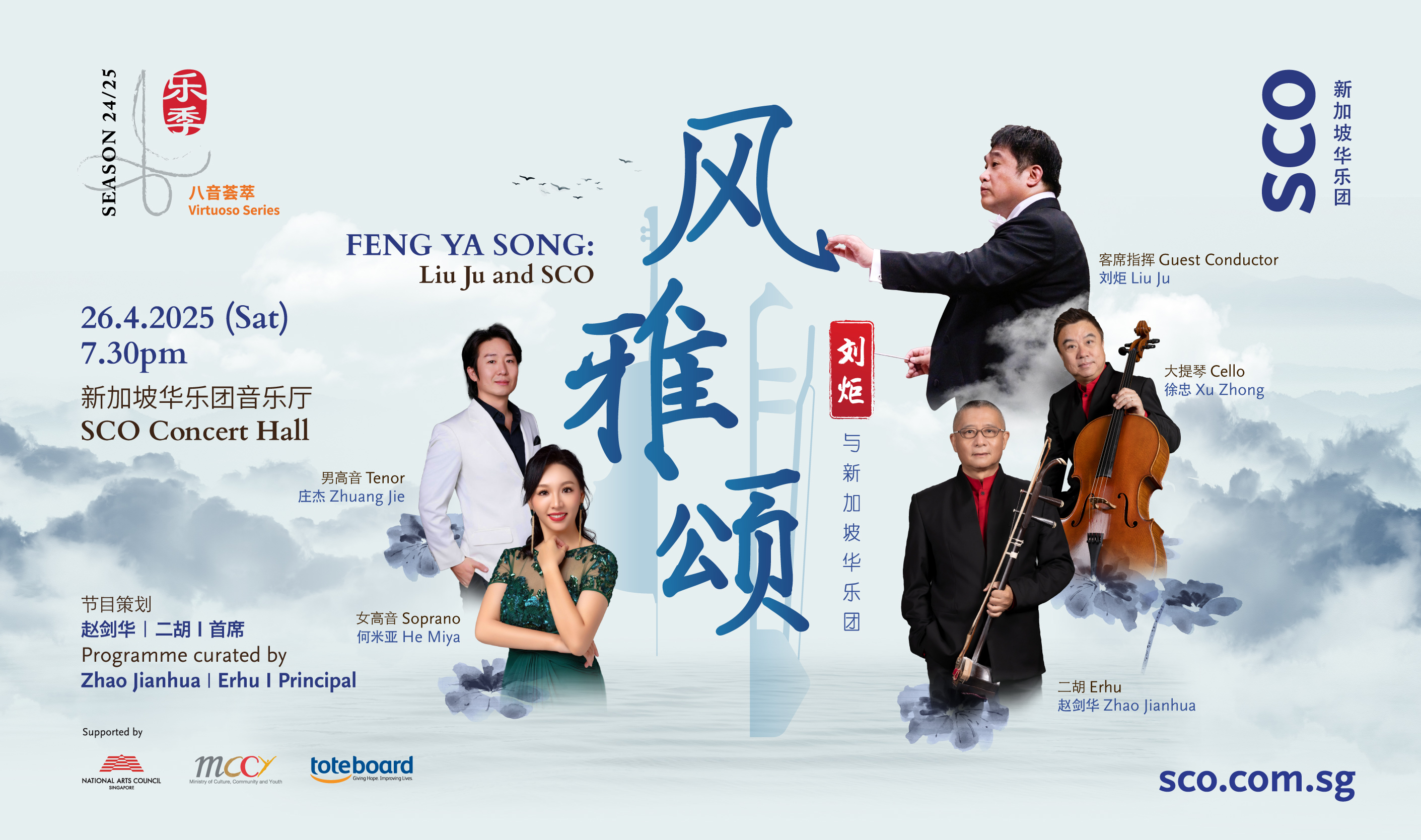Concert Season 24/25 | Chamber Charms 乐季24/25 | 室内乐系列
文 / 高程锦
“结知音,续琴缘” 是新加坡华乐团首席指挥郭勇德寄托在本乐季“融汇”上的意愿, 而《新乐芳华汇知音》正以此兴致, 邀约台上、台下的同伴一起共享跨时代、跨文化的音乐交流。作为新加坡华乐团弹拨乐五重奏“新乐芳华” 系列的第二场音乐会, 除了主要成员以外, 也力邀乐团“知音们”: 弹拨乐演奏家张丽、饒思銘、曾靖文、王思元、梁名慧、与客卿印度鼓演奏家Joe Jayaveeran共同担纲演出, 以曲会友。由郭勇德担任艺术指导、弹拨声部长/三弦首席黄桂芳与琵琶首席俞嘉精心遴选的七首曲目风格迥异, 反映传统与当代语汇、传承与创作的互相融合。
音乐会以中国作曲家徐晓琳于1988年创作、乐团阮演奏家郑芝庭整理的经典五重奏《木兰从军》亮相。乐曲主题取材于陈宪章于1951创作的豫剧《花木兰》的独唱选段 “刘大哥讲话理太偏, 谁说女子享清闲?”, 在“威武、有力”的马蹄声后出现, 顿挫抑扬、性情豪放。豫剧, 又称河南梆子, 植根中原文化沃土。据中国豫剧据中国豫剧传承人李树建所说,豫剧演的是家国情怀与忠孝节义。五重奏《木兰从军》戏味浓郁,富有鲜明的节奏、明快活泼的旋律,如黄桂芳所言,彰显永不过时的传统风格。
如果花木兰穿越到现代, 身为青年的她, 也许也会从香港作曲家陸尉俊的《弹拨摇滚》找到些许共鸣。这首于2020年从琵琶独奏改编成重奏的版本以琵琶、中阮和大阮的口吻, 传递热血、飒爽的精神。曲子中西合璧、兼容并蓄, 模糊文化的分界线: 著名琵琶曲《十面埋伏》引入乐曲“正题”, 所用的蓝调旋律以五声音阶为基础, 乐曲也借鉴许多与民乐乐器技巧有着相似之处的电吉他与电贝斯技巧。切分音和轻快旋律的贯穿, 让整个氛围既放松又充满活力。
自古以来, 除了奏乐, 明月下亦是知友举杯, 共饮清辉之处。在王以东新创作的《明月几时有》里, 弹拨乐的轻盈交错声与演奏家们吟唱苏轼词作的声线共凝造出宁静又唯美的意境。诗词的音乐性和真挚的情感都体现在这新谱写的“水调歌”里, 以弹拨乐五重奏的形式, 传递中华传统文化之古典美。而边演奏边担任演唱, 黄桂芳道, 是器乐重奏里比较新颖的形式。俞嘉也表示, 乐曲在演奏家的一次又一次的排练中根据他们演奏以及演唱的特性, 不断进行修改, 可说这借月抒情、扣人心弦之作是作曲家及“芳华”五位成员共同创作。
在《明月几时有》里, 五重奏需边唱边弹, 而曹文工作曲, 郑芝庭整理的《风雨归舟》, 则以奏乐为观众敷演故事。作为与《木兰从军》一同是今晚的传统曲目代表, 曲子灵感来自于中国北方鼓书, 一种传统说唱艺术。说唱人一手敲打着鼓面, 一手敲击木板, 随着节奏, 用方言唱出富有韵律、合辙押韵的词曲。鼓书主要的伴奏乐器为三弦, 而节拍也会随着故事内容的起伏转变。通过这首作品, 观众可以体会到富有叙述性, 通俗易懂的鼓书唱词, 与说书人生动活泼、轻松质朴的表达。
跨文化的乐器中, 是否也能觅得“知音”? 孙晶于2018年作曲的琵琶与印度鼓协奏曲《静默之弦》主要融合西塔儿和琵琶的一些相近的演奏方式和音色, 如滑琴桁和推拉弦产生的滑音、装饰音的处理、琴弦的共鸣效果等。王辰威新改编的西塔儿、琵琶与印度鼓三重奏版除了保留原有的素材, 也添加新对应的乐句与节奏, 赋予音乐新的生命力, 使两件类似但独特的乐器碰撞出出其不意的火花。特别担纲西塔儿演出的是俞嘉, 她表示, 通过演奏印度这经典的传统乐器, 让她学习并更加深入了解印度文化, 而这样的精神追求, 正是新加坡这多元文化的国度所一贯倡导的。
一切归于“静默”后, 生命往往又会“悄然”生长, 周而复始。李博禅于2016-2017年创作的《悄然》描述从无到有, 再从有到无的过程: 开头柔和的旋律徐缓如歌, 逐渐发展成犹如落叶纷飞的快板, 将庄严的主题带到高潮后再回到最初的寂静。“自然万物始于悄然无声,随后悄然绽放, 在绽放后重回悄然无声。”乐曲风格深情飘逸、韵味悠长, 让人回味无穷。
由王辰威2021年创作、特地改编的《弦炫II》是今晚的压轴曲目。何为“炫”? 炫, 在于此曲渗透的各种性情; 炫, 在于旋律、和弦与节奏上的热情放逐; 炫, 在于各个乐器不息又多层次的交织; 炫, 在于清脆悦耳与柔润厚重的音色的相辅相成, 浓淡有致。在这版本里, 卡宏鼓的加入, 与演奏员的增加, 让这场绘声绘色、古韵新声、跨界融合的音乐会在激昂的情绪中完美落下帷幕。
By KOH Cheng Jin
Aligning with this season’s “Seamless” theme, “finding musical soulmates, continuing musical affinity”, as outlined in the season foreword by SCO Principal Conductor Quek Ling Kiong, is an essential inspiration behind Chamber Charms: Vibrant Strings II. As Vibrant Strings’ second concert curated by Plucked String Section Leader/ Sanxian Principal Huang Guifang, Pipa Principal Yu Jia and Quek Ling Kiong, other additional SCO musical “soulmates” are specially invited, namely plucked string musicians Zhang Li, Ngeow Si Ming Jonathan, Chan Jing Wen Kenny, Wang Siyuan, Liang Ming-Huei, and also guest Indian percussionist Joe Jayaveeran, to participate in this exciting concert of diverse music across time and culture.
The first piece, Mulan Joins the Army composed by Xu Xiaolin in 1988 and arranged by SCO ruan musician Cheng Tzu Ting, is based upon an empowering line sung by the titular character in Chen Xianzhang’s Yu Opera/Henan “bangzi” Hua Mulan created in 1951. Yu Opera has roots in regions around the Yellow River in Northern China and is one of the country’s major opera genres. According to Yu Opera specialist Li Shujian, common storylines revolve around loyalty to family and country inspired by beloved Chinese legends. Imbued with a noble character, powerful rhythms and melodies, this folk inspired music is an iconic symbol of timeless tradition.
If Hua Mulan time travels to the present, she might resonate with Hong Kong composer Luk Wai Chun’s Tan-Tiao Rock, a spirited, bold trio arranged in 2020 from the original solo pipa version. In this version spotlighting the pipa, zhongruan and daruan, boundaries between East and West are blurred, with the incorporation of renowned pipa masterpiece Ambush from Ten Sides, blues melodies which are based on the pentatonic system, and techniques that evoke the presence of the electric guitar and bass. Syncopations and lively melodies throughout the work characterize it as one that is both relaxed and energetic at the same time.
Compared to the other pieces, Reminiscing through Moon-gazing by Wang Yidong is unique in how the musicians also sing Song Dynasty poet Su Shi’s classic lines alongside playing their instruments. The lyricism and deep emotions of these expressive words are aptly captured by this contemporary musical interpretation, where the lasting beauty and elegance of Chinese culture is palpable. In Huang Guifang’s words, singing while performing on instruments is rather unconventional in chamber music. According to Yu Jia, the work was shaped during each and every rehearsal—one can perceive it as a special collaborative piece jointly created by both the composer and the quintet.
While Reminiscing through Moon-gazing features both singing and playing, Returning Boat from Wind and Rain composed by Cao Wengong in the 1980s and arranged by Cheng Tzu Ting is purely instrumental but with a narrative purpose. A traditional piece like Mulan Joins the Army, it is inspired by gushu, or drum/narrative singing, a performance genre popular in Northern China. In this melodic art form, the performer usually tells stories in local dialects while beating a drum with one hand and playing a clapper with another. Indispensable in the accompaniment is the sanxian, and the tempo of the music also shifts often to capture the dramatic elements of the story. In this charming piece, the overall joyful character, approachability and dynamic storytelling of gushu can certainly be discernible.
Can one find musical “soulmates” among instruments of different cultures as well? The Silent Strings, a concerto for pipa and tabla composed by Sun Jing in 2018 is novel in how it evokes playing techniques and sound colors of the sitar through the pipa. These include various pitch-bending and ornamentation effects, as well as the inherent resonance quality of the strings. In this rearrangement for sitar, pipa and tabla by Wang Chenwei, new contrapuntal lines and rhythms are tastefully appended to the existing musical materials, enhancing the connection between these two plucked string instruments that share some similarities but are also distinguishable in many ways. The sitar will be performed by Yu Jia, who has developed greater interest in Indian culture through learning this prominent Hindustani classical instrument.
Blossom at Dawn, composed by Li Bochan in 2016-2017, is a sentimental reflection of the impermanence of life, where living beings undergo cyclical, never-ending states of growth and decay. In the music, a yearning melody takes time to bloom in the opening, before a dance-like, fast-paced section culminates into a climax which leads back to quiet peace. As the composer ruminates, “all beings emerge from hushed silence, then bloom, before returning to hushed silence again.”
As the closer for this evening’s concert, Wang Chenwei’s Vibrant Strings II is indeed vibrant on many dimensions—the multiple characterizations, the inventive melodic, harmonic and rhythmic episodes, the intertwined relations between all instruments, and the coalescence of pearl-like, shimmering textures with warm, mellow timbres. In this specially arranged version, the newly added cajon and instrumental forces partake in closing this celebration of tradition, modernity and cultural voyages with a grand and glamorous flourish. Chamber Charms: Vibrant Strings II is truly a ravishing spectacle of imagination and creativity, conveyed through the ageless magic of plucked string instruments.



